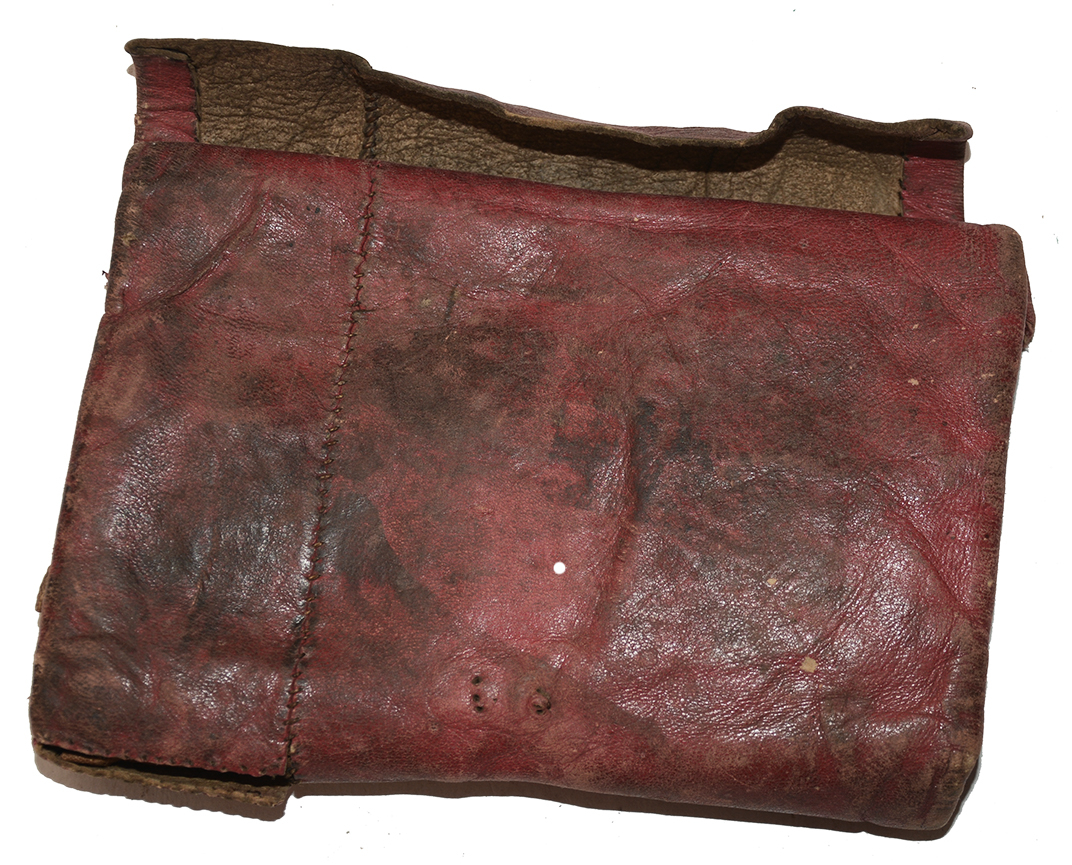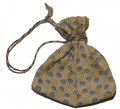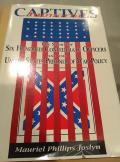site search
online catalog
IDENTIFIED CONFEDERATE OFFICER'S "HOUSEWIFE"

$435.00 SOLD
Quantity Available: None
Item Code: 88-213
Sewing kits, in soldier parlance “housewives,” were common going-away gifts from mothers, wives, sweethearts, and charitable sewing circles to departing soldiers who would have to fend for themselves in mending uniforms, resewing buttons, etc. This particular example was made for and carried by Corporal/Captain James K. Polk Lytle of the 23rd Tennessee Volunteer Infantry CSA one of "The Immortal Six Hundred".
This housewife appears to be made of red Moroccan fine Kidd skin leather. It measures when unrolled 13 inches long and is 6 inches wide. There are 4 compartments made of fine cotton. One was found to contain a small bag for spare buttons and it is still with it. One of the pockets has on it "J.K.P. L." in black ink, turned age brown. There are 6 red Moroccan leather loops to hold needles etc. The entire sewing kit is hand stitched. There are 2 small adjoining open seams on the leather exterior and there must have been a leather "tongue" or strap that extended a few inches to a fastening tab/button, but this was cut off long ago.
"The 23rd Tennessee Infantry Regiment was organized on July 31, 1861. Re-organized on May 8, 1862. At Shiloh with 570 men engaged it came out of the battle with 327 effectives. They were present at the surrender of the Union forces at Munfordville, Kentucky and taking an active part in the battle at Perryville, Kentucky with 201 men engaged of which 52 were causalities. At Murfreesboro with 272 engaged, lost 63 men. At Hoover's Gap, Tennessee losing five. At Chickamauga 181 were engaged, with ninety-eight causalities. In late 1863 they were combined with the 17th Tennessee and detached from the Army of Tennessee and sent with General Longstreet in his campaigns in East Tennessee, fighting at Fort Loudon, Bean's Station, Walthall Junction, Swift Creek and Drury's Bluff, Virginia. Involved around Petersburg, Virginia they surrendered at Appomattox Court House."
It was with Longstreet that Captain J.K.P. Lytle (Capt James Knox Polk Lytle (1838-1879) - Find a Grave Memorial) and his company were captured. This was December 14th, 1863, while, according to family tradition, they were attending a BBQ hosted by his friends. Although prison records record his capture at the battle of Bean's Station on the 18th, the family story holds water since the 23rd was not actively engaged in the battle. Imprisoned the unfortunate Captain Lytle was selected to be one of those sent to Charleston harbor. "In October 1864, Union troops stationed at Fort Pulaski accepted transfer of a group of imprisoned Confederate officers who later became known as The Immortal Six Hundred. Before arriving at Fort Pulaski, the prisoners were being held in South Carolina. Edwin M. Stanton, Federal Secretary of War, ordered those 600 prisoners of war be positioned on Morris Island in Charleston harbor within direct line of fire from Confederate guns at Fort Sumter. Stanton's order was a response that followed word that 600 Union officers imprisoned in the city of Charleston were exposed to direct line of fire from Federal artillery. This standoff continued until a yellow fever epidemic forced Confederate Major General S. Jones to remove the Federal prisoners from the city limits. The Confederate prisoners were then transferred the from the open stockade at Morris Island to Fort Pulaski at the mouth of the Savannah River. On October 23,1864, over 500 tired, ill-clothed, men arrived at Cockspur Island. Early on the emaciated troops received extra rations and were promised extra blankets and clothing. However, despite the best intentions of the fort's command, the prisoners never received sufficient food, blankets or clothes. During the Immortal Six Hundred's incarceration at Fort Pulaski, thirteen prisoners died. The dead were buried on site at Cockspur Island. Most died of dehydration due to dysentery. In March of 1865, the remainder of the prisoners were transferred to Fort Delaware located 15 miles south of Wilmington, DE."
This housewife was once in the famous Texas Civil War Museum. It was found by the consignor among several other Civil War items of clothing belonging to Captain Polk. All these clothing items came directly from the descendants of Lytle and were confirmed through forensic testing to be of the Civil War period. This would be a nice addition to a display of a Confederate soldiers’ personal gear. The “housewife” in its many variations, from the relatively simple, as this "homespun" is to the more complex combination kits that displayed the most modern improvements, satisfied a sense of novelty, and promised greater convenience and comfort for the soldier in the field. [pe][ph:L]
~~~~~~~~~~~~~~~~~~~~~~~~~~~~~~~~~~~
THIS ITEM, AS WITH ALL OTHER ITEMS AVAILABLE ON OUR WEB SITE,
MAY BE PURCHASED THROUGH OUR LAYAWAY PROGRAM.
CLICK HERE FOR OUR POLICIES AND TERMS.
THANK YOU!
Inquire About IDENTIFIED CONFEDERATE OFFICER'S "HOUSEWIFE"
For inquiries, please email us at [email protected]
Most Popular
Historical Firearms Stolen From The National Civil War Museum In Harrisburg, Pa »
Theft From Gravesite Of Gen. John Reynolds »
Selection Of Unframed Prints By Don Troiani »
Fine Condition Brass Infantry Bugle Insignia »
Wonderful Condition Original Confederate-Manufactured Kepi For A Drummer Boy Or Child »
featured item
PIECE OF WOOD FROM THE ROOM IN THE WHITE HOUSE WHERE LINCOLN SIGNED THE EMANCIPATION PROCLAMATION
“A piece of wood from the White House where President Lincoln signed the Emancipation Proclamation and usd (sic) as a private office by the Presidents since Jefferson’s time. Presented to Genl. W. J. Palmer by his friend and Comrade Col. W.M.… (945-297). Learn More »
site search
Upcoming Events
The shop will remain closed to the public through Friday, Jan. 31st, re-opening on Saturday, Feb.… Learn More »










